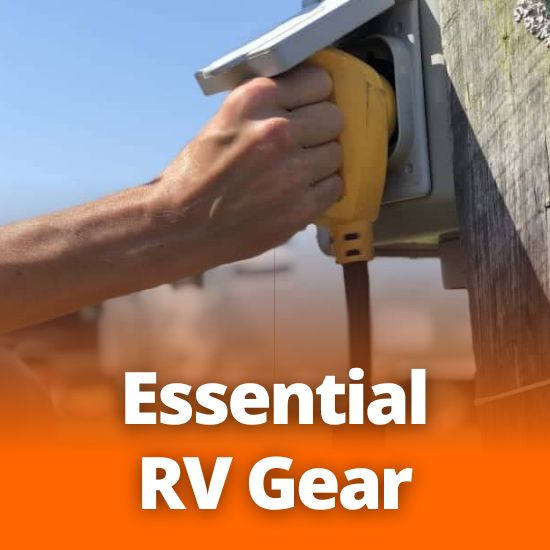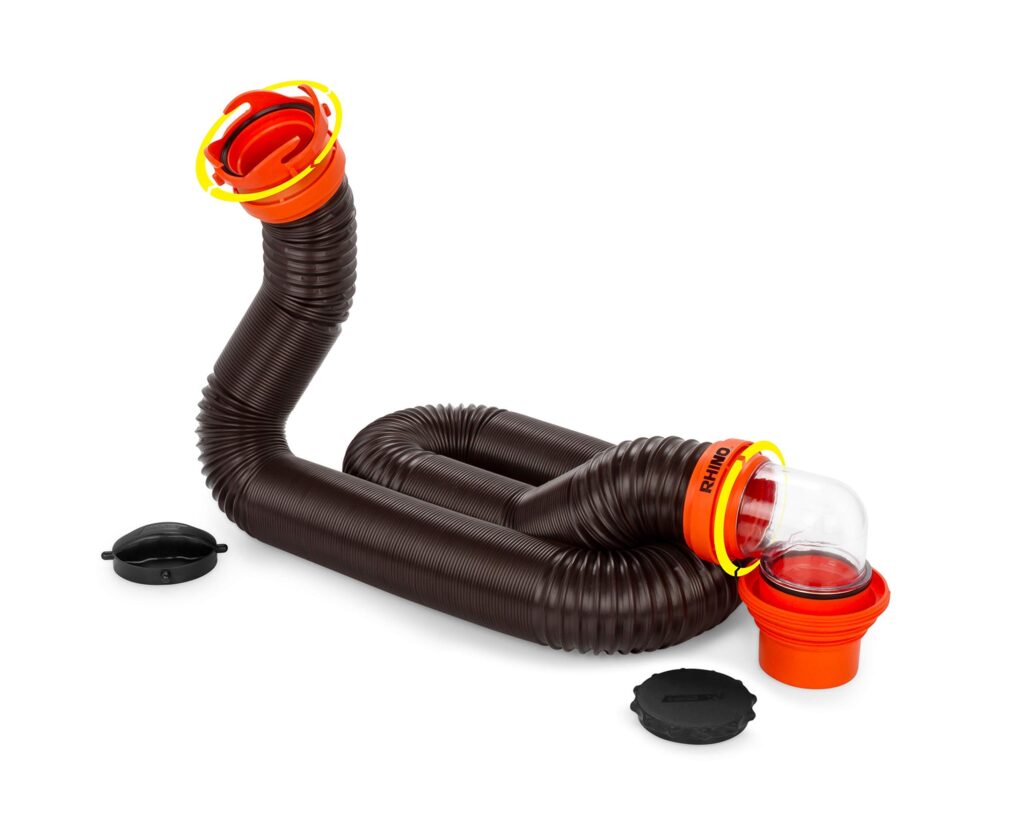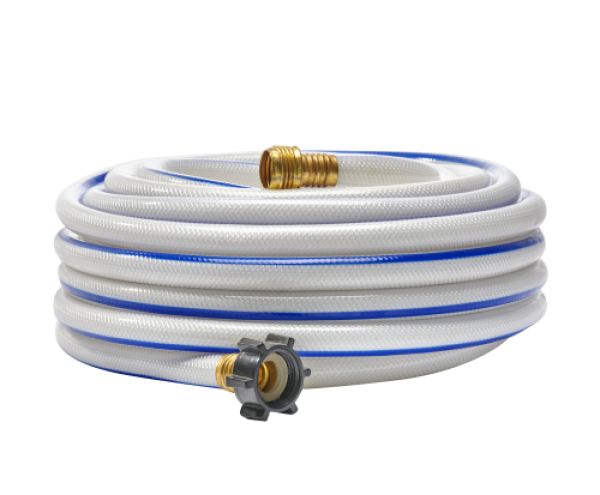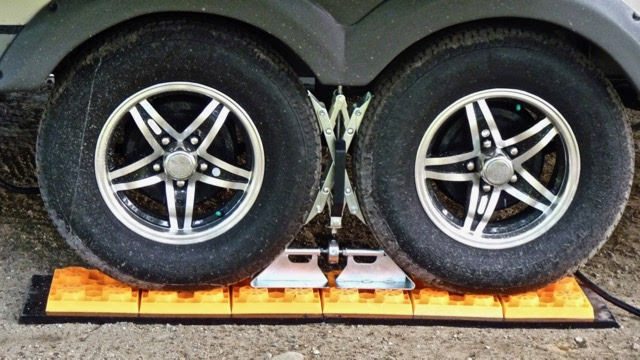
Essential RV Gear
We’ve all had that experience, you get a new rig, walk into the store and get overwhelmed with the endless rows of gear, each new and shiny toy screaming “ESSENTIAL” “MUST HAVE” “PERFECT FOR YOU” and any manner of taglines to get you to spend your hard earned cash.
Well I’m here to tell you that a lot of that is absolute bull – there are only a few absolute, you need to have this, items – everything else is either totally unnecessary, or just a “oh yeah, it’s nice to have.”
Hold Up!
Before you even get going, remember to slow down. Sometimes when you’re so eager to get moving on your adventure you’ll get ahead of yourself but this kind of super eager, no time to spare mindset is not helpful when you’re packing up or setting up at camp. So remember to give yourself a good buffer of time on the days where you’ll be traveling and tearing down or setting up camp. Remember, the journey is part of the adventure. We’ve got checklists for both to help you out here and here.
Number 1, the most important: DUCT TAPE. Whether it’s because of a broken awning or you need a temporary way to seal a broken window. Duct tape – it’s nature’s catch all! (Well, that and heavy duty garbage bags)
We go into more detail on some of the following gear here so you can use this as more of a checklist to help you prepare!
Note: This post contains links, we are unaffiliated with any products/companies therein.
Sewer
- Sewer hose: Sometimes the more expensive or “premium” version isn’t actually the best. This is one example that includes a clear elbow attachment that we’ve found works well: Camco RhinoFLEX 15ft RV Sewer Hose Kit, Includes Swivel Fitting and Translucent Elbow with 4-In-1 Dump Station Fitting, Storage Caps Included, Flex
- SideWinder: This keeps your sewer hose off the ground, yeah maybe that doesn’t sound like it’s totally necessary but some parks actually require you to keep your hose off the ground. And wouldn’t you rather have one on hand so you don’t have to go into (probably their) store and pay three times as much? We’ve found one on Amazon for you to check out: Camco Sidewinder 20-Ft Camper/RV Sewer Hose Support | Telescoping Design Flexes Around Obstacles & Deep Cradles Secure Sewer Hose | Out-of-the-Box Ready & Folds for RV Storage and Organization (43052) : Amazon.ca
- Plastic gloves: There is absolutely a way to be totally sanitary and keep your hands clean, but having these on hand is an extra way to keep clean.


Fresh Water:
- Potable water hose: While you can use a regular garden hose, they won’t always be appropriate for drinking water even with a filter. Find one that is rated for drinking water.
- One thing I and many others love (and this is not sponsored) is a kink free hose like this one but there are many others on the market.
- Water Pressure Regulator: Whether you’re going whole ham with the pricey one that lets you see the pressure, or a standard one without the extra bells and whistles, it’s a necessity to avoid damage to your RV’s water system.
- Water Filter: There are many that filter at different micron levels, but you never know just what’s in the water you’re filling up with that you shower and clean with. So go to your comfort level, but always have one. (Some trailers will actually have filters built in!)
Electrical:
- Electrical Adaptor: These will come in different amperages (30 amp, 50 amp, etc) and if you camp a lot you may find yourself needing several. So do your best to figure out what you’ll need at your chosen site(s)
- Extension cord(s): Make sure you’re using the right gauge. Some people find they only need a 15-foot extension, others like to have a variety between 15, 50, and 75 feet for convenience because they like to go between multiple sites.
- Having all the different adaptors available when you first start out isn’t necessary. But if you RV a lot, you’ll begin to see that a single 50 amp cord isn’t always going to be enough. So for convenience, having a 50 to 30 amp extension is a good starting point to have on hand.
Gauge | Amps | Watts |
#14 | 12 | 1440 |
#12 | 16 | 1920 |
#10 | 24 | 2880 |
#8 | 32 | 3840 |
- Surge Guard: Some you can plug in to gauge whether the power hook-up is providing a good current before you plug into your rig – others will do both at the same time, not sending any power to your RV if it suspects anything wrong with the panel. There are a variety of levels and price points, so go with what works for you.
Tires:
- Chocks: It’s very tempting to just get the cheap plastic ones, or use a scrap hunk of a 2×4, but the plastic ones are one move away from becoming dust and a 2×4 can be easily driven over with enough oomph behind a move. Proper chocks are a necessity. Not using them is a fast way to lose your RV
- You can also use X-Chock Wheel Stabilizers for added stability, but they do not replace wheel chocks!
- Leveling blocks
- Trailer grade tires: ST tires, not LT (light truck) tires. We’ve come a long way when it comes to tires for trailers. ST tires are a bit stiffer on the sidewalls, and are better for towing in the sense that the rubber compound is designed not to break down as quickly so, even when the trailer is in storage, the rubber will last longer in comparison to others.
- This one is up to you! There’s nothing wrong with an LT tire, just know there are differences between it and an ST tire.

Tools:
Generally speaking, you want your tool kit to be at your level and comfort of handiness for repairs. If there’s a system you know you won’t be able to deal with, having tools for it is pointless. Keep on hand what will make you feel secure should you need to fix something yourself (or if someone more handy comes along to help).
For example, if you’re not comfortable with electrical: Anything more than “oh I should turn that off and get it looked at” is extra weight.
- Tire Air Pump/System: Not essential, as the majority of trailers have D rated tires (up to 65 PSI) and are therefore easily fillable at gas stations where air is available. When it becomes necessary to have it is when you have tires that go above 65 PSI – so keep that in mind.
- Lug Nut Wrench: Lug nuts on a trailer are different from those on a truck, when a flat tire happens and you’re able to change it yourself – have this with you.
- Monkey wrenches, dry lube (doesn’t attract more grease), socket wrench kit, PSI meter, jumper cables, ratchet straps, work lights (good for nighttime damage checks), and work gloves are all good basics to have in your kit
- Good First Aid Kit! Be ready for burns, cuts, and other injuries, especially if you’re going to be boondocking or traveling in low or zero service areas.
Is there anything we missed? If you’re an established RVer, let us know if there’s anything you would add to our list!